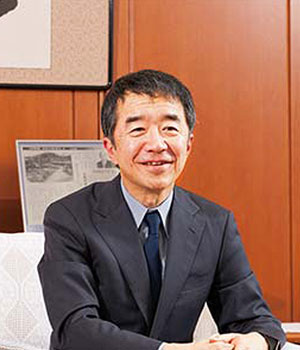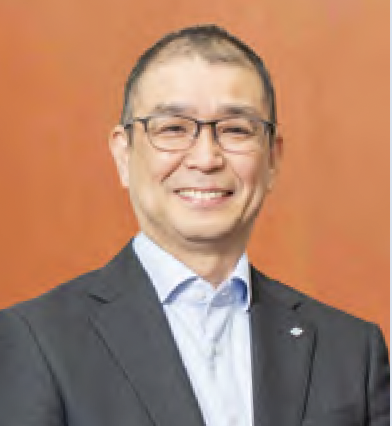
Completed a doctoral program in business administration at Osaka City University Graduate School. After serving as an assistant professor at Osaka City University and Kobe University, he assumed his current position in 2001.
Head of the Graduate School of Business Administration at Kobe University from 2014 to 2016 and from 2021 to the present. Has served concurrently as the head of the Graduate School of Business Administration at Kobe University (from 2019 to 2021) and as Head of Kobe University Value School (since 2020). His recent publications include “From Accountability to Management Ethics” (Yuhikaku Publishing Co., Ltd.), “Emergent-Type Responsibility Management” (Nikkei Publishing Inc.), “Education for Value Creation” (Kobe University Publishing Association), and “Ethics as Responsibility” (Minerva Shobo).
Sumitomo Rubber Industries, Ltd. announced its Longterm Corporate Strategy for 2025 to 2035. For a long-term corporate strategy in an increasingly uncertain and unpredictable environment, as the company claims, “Building a Resilient Management Foundation” is essential.Under such difficult environment, the company positions human capital management and sustainability management as a means to strengthen its foundation, which demonstrates its commitment to building the foundation of the company’s management on human resources and society, which is highly commendable.
Going forward, it is necessary to integrate human capital management into sustainability management and steadily promote development.To achieve this, it is necessary to go beyond balancing social value and customer value, and to provide social value as customer value respectively and show a path to evolve customer value into social value.I believe it will be a way to embody a future created through innovation, and I look forward to the company’s future activities.
One of the features of this year’s report is that messages are delivered individually or in the form of dialogue by internal members at diverse levels, including the President and CEO, outside directors, responsible executive, executives, and front-line managers.In particular, the articles in the form of roundtable talk feature sincere discussions about the issues and risks within the company, show a strong attitude toward striving for improvement, and it makes clear that the company's policies are permeated throughout the company.In the future, if opinions of diverse stakeholders including customers, investors, students and local residents are incorporated into the report, I feel it would be easier for readers to understand the entire picture more objectively.I am aware that in this integrated report, the priority is placed on posting information intended for institutional investors. I think disclosing more detailed information about engagement with institutional investors would be worth considering.
The Integrated Reporting Framework has been integrated into the International Accounting Standards Board (IASB) and the International Sustainability Standards Board (ISSB), both of which are under the IFRS Foundation, and an integrated report is expected to become a report that should be positioned within the overall sustainability information disclosure scheme in the future. To this end, it is extremely important to combine the sustainability information dictated by ISSB S1 and S2 sustainability disclosure standards with the value creation concept of the Integrated Reporting Framework.Sustainability information disclosure tends to be mere formality; however, I hope that the company will properly apply the criteria for material issues in integrated reporting and evolve its reports which promote substantive sustainability activities from a long-term perspective.
I would like to thank Professor Kokubu for his always insightful opinions and valuable advice.
In 2024, amid changes in the business environment surrounding our Group, we renewed the material issues of our Group, which were a prerequisite for formulating our Long-Term Corporate Strategy. Taking into consideration of the opinions of Professor Kokubu, we had repeated dialogues with our management team based on our corporate philosophy, the “Sumitomo Business Spirit” and announced our “Vision” and "The Company’s Intentions.” In January 2025, we established a Sustainability Advisory Board to facilitate dialogue between external stakeholders and management team, and are currently working to collaborate with stakeholders.
In our long-term corporate strategy announced in March 2025, our vision in 10 years is defined as “Continuing to Provide ‘New Experiential Value’ Born from Rubber to Everyone.” To achieve this, we believe that linking human capital management with sustainability management and steadily promoting them will lead to building a resilient management foundation. In terms of human capital management, we will implement measures that will lead to the development of human resources who will open the way to the future, and also, we will create an environment in which employees can thrive with a sense of fulfillment in their own way while remaining healthy, both physically and mentally. As part of our initiatives to build a foundation for creating new value, we chose to feature the topic of “Future Factory Project for Better Workplaces” in a roundtable talk among employees.
As with the last year’s edition, we aimed to deliver messages to readers that are easy to understand from the management team including the President and CEO, as well as outside directors and employees. We hope that this integrated report will provide insight into our thoughts and the actual state of initiatives toward value creation through our Long-Term Corporate Strategy, which could not be conveyed in other disclosed documents. In addition, a roundtable talk among outside directors provides cutting-edge information on governance within our Group.
As Professor Kokubu mentioned, we recognize that disclosure of information regarding communication with stakeholders is an issue that needs to be addressed in the future. In particular, we will keep trying to create value in the medium to long term through constructive dialogue with our shareholders and investors, and will also promote information disclosure.
In order to ensure that sustainability information disclosure is not merely a formality, we will take a long-term perspective based on the material issues and promote activities that will lead to value creation aimed at resolving social issues through our business.

Hitoshi Hino
Executive Officer
Head of Corporate Planning and
Global New Site Project
(Responsible for Sustainability, DX,
Cybersecurity, PR)